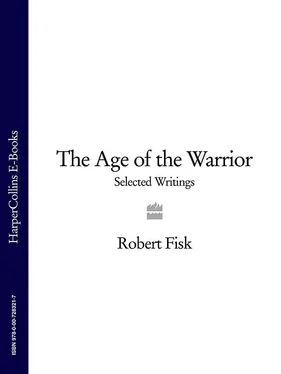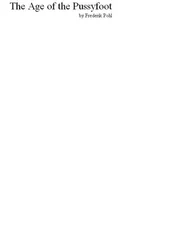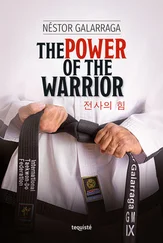It is a disease, this language, caught by one of our own New Labour ministers on the BBC last week when he talked about ‘environmental externalities’. Presumably, this meant ‘the weather’. Similarly, an architect I know warned his client of the effect of the ‘aggressive saline environment’ on a house built near the sea. If this advice seems obscure, we might be ‘conflicted’ about it – who, I ask myself, invented the false transitive verb? – or, worse still, ‘stressed’. In northern Iraq in 1991, I was once ordered by a humanitarian worker from the ‘International Rescue Committee’ to leave the only room I could find in the wrecked town of Zakho because it had been booked for her fellow workers – who were very ‘stressed’. Poor souls, I thought. They were stressed, ‘stressed out’, trying – no doubt – to ‘come to terms’ with their predicament, attempting to ‘cope’.
This is the language of therapy, in which frauds, liars and cheats are always trying to escape. Thus President Clinton’s spokesman claimed after his admission of his affair with Monica Lewinsky that he was ‘seeking closure’. Like so many mendacious politicians, Clinton felt – as Prime Minister Blair will no doubt feel about his bloodbath in Iraq once he leaves No. 10 – the need to ‘move on’. In the same way, our psychobabble masters and mistresses – yes, there is a semantic problem there, too, isn’t there? – announce after wars that it is a time for ‘healing’, the same prescription doled out to families which are ‘dysfunctional’, who live in a ‘dystopian’ world. Yes, dystopian is a perfectly good word – it is the opposite of utopian – but like ‘perceive’ and ‘perception’ (words once much loved by Jonathan Dimbleby), they have become fashionable because they appear enigmatic.
Some newly popular phrases, such as ‘tipping point’ – used about Middle East conflicts when the bad guys are about to lose – or ‘big picture’ – when moralists have to be reminded of the greater good – are merely fashionable. Others are simply odd. I always mixed up ‘bonding’ with ‘bondage’ and ‘quality time’ with a popular assortment of toffees. I used to think that ‘increase’ was a perfectly acceptable word until I discovered that in the military sex-speak of the Pentagon, Iraq would endure a ‘spike’ of violence until a ‘surge’ of extra troops arrived in Baghdad.
All this is different, of course, from the non-sexual ‘nobrainers’ with which we now have to ‘cope’ – ‘author’ for ‘authoress’, for example, ‘actor’ for ‘actress’ – or the fearful linguistic lengths we must go to in order to avoid offence to Londoners who speak Cockney: as we all know – though only those of us, of course, who come from the Home Counties – these people speak ‘Estuary’ English. It’s like those poor Americans in Detroit who, in fear and trepidation, avoided wishing me a happy Christmas last year. ‘Happy Holiday!’ they chorused until I roared ‘Happy Christmas’ back. In Beirut, by the way, we all wish each other ‘Happy Christmas’ and ‘Happy Eid’, whether our friends are Muslim or Christian. Is this really of ‘majority importance’, as an Irish television producer once asked a colleague of a news event?
I fear it is. For we are not using words any more. We are utilising them, speaking for effect rather than meaning, for escape. We are becoming – as the New Yorker now describes children who don’t care if they watch films on the cinema screen or on their mobile phones – ‘platform agnostic’. What, Polonius asked his lord, was he reading? ‘Words, words, words,’ Hamlet replied. If only…
The Independent , 13 January 2007
Poisonous academics and their claptrap of exclusion
That great anthropological sage Michael Gilsenan – whose Lords of the Lebanese Marshes once almost started a small civil war in northern Lebanon – turned up this week to lecture at that equally great bastion of learning, the American University of Beirut, founded, as it happens, by Quakers during the nineteenth- century Lebanese Christian–Druze conflict. Gilsenan’s subject was abstruse enough: Arab migration to what our Foreign Office still calls ‘the Far East’. Most of these migrants, it transpired, came from Arabia, especially the mountainous Hadramaut district of Yemen. Under British rule, they prospered, bought land, left inheritances and, once established, wealthy Arab women also took their place in this new world, even involving themselves in legal disputes.
All very fascinating. But once questions were invited from the floor, Gilsenan was asked about ‘matrilineal’ issues in colonial Singapore. I closed my eyes. ‘Matrilineal’ doesn’t exist in my dictionary. Nor is it likely to. It is part of the secret language of academe – especially of anthropology – and it is a turn-off. We poor dunces should keep our noses out of this high-falutin’ stuff. That, I think, is the message. I recall a student raging to me about her anthropology professor who constantly used words like ‘emic’ and ‘etic’ – to this day, I have no idea what they mean; readers are invited to reply – in an attempt to mystify her discipline.
Keep Out, these words say to us. This Is Something You Are Not Clever Enough to Understand. A French professor put it to me quite bluntly this week. ‘If we don’t dress up what we want to say in this silly language,’ she announced, ‘we are told we are being journalists.’ Well, well, I can quite see the problem. It’s good against evil, us or them, university scholarship or dirty journalism. It’s a new and dangerous phenomenon I’m talking about, a language of exclusion that must have grown up in universities over the past twenty years; after all, any non-university-educated man or woman can pick up an academic treatise or PhD thesis written in the 1920s or 30s and – however Hegelian the subject – fully understand its meaning. No longer.
About three years ago, I received a good example of this from Marc Gopin, visiting associate professor of international diplomacy at the Fletcher School of Tufts University and a visiting scholar in the programme on negotiation at Harvard. I received his latest book for review, a tome called Holy War, Holy Peace: How Religion Can Bring Peace to the Middle East . A promising title, you might think. Well, think again. For within pages, I was being bushwhacked by ‘metaphorical constructs’ and ‘universalist mythic constructs’ and ‘romanticised, amoral constructs of culture’ and ‘fundamental dialogic immediacy’ and ‘prosocial tendencies’. Here is another cracker: ‘The Abrahamic myth of a loving Patriarch and a loving God who care for a special people has created a home and a meaning system for millions of human beings.’ Come again? Meaning system? The author grew up, he says, ‘in a self-consciously exilic spirituality’. He talks about the ‘interplay’ of ‘political and mythic interdependencies’ and the ‘ubiquitous human psychological process of othering’. He wants to ‘problematise’ intervention at ‘elite’ levels. A rabbi – whom I immediately felt sorry for – was ‘awash in paradoxicality’, which apparently proved that ‘cognitive dissonance is good for intractable conflicts’. Well, you could have fooled me. There was more: ‘dialogic injuries’, ‘cultural envelope’, ‘family psychodynamics’, ‘the rich texture of hermeneutic possibility’, ‘porous barriers of spiritual identity’ and, of course, my old favourite, ‘social intercourse’. ‘Dialectic apologetics’ makes an appearance, alongside ‘persecutorial othering’ and lots of other ‘otherings’, including a reference to ‘pious transformation of old cognitive constructs as an end to othering: remythification’.
Читать дальше












